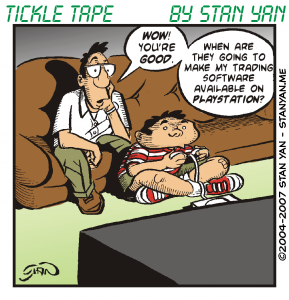When your money is on the line, it’s natural to feel uncertain and a little cautious. You don’t want to lose it. You want to take every precaution possible to protect yourself. But there’s taking realistic precautions, on the one hand, and overdoing it on the other. It’s useful to know what you can and cannot control and devote your energies to where they can make the most difference.
The markets are uncertain. Indeed, it’s not just the markets, but life in general. As much as we have a strong desire to control our destiny, sometimes we just can’t. There are times when what is meant to happen is just meant to happen. All the anticipating and planning isn’t going to change matters.
Sometimes you’ll just waste your time and energy trying to change and control events that you just can’t change. That’s what makes life difficult: learning what you can and cannot change. Most events are a matter of chance. There’s some uncertainty that goes along with the trials and tribulations of everyday life. That said, there is still a desire to gain as much control as possible. When it comes to trading, however, it can be time poorly spent.
The more you try to control events, the more stress you feel. It’s not prudent to think you are completely helpless, however. The markets are risky, and it’s wise to take some precautions, such as controlling the amount of money you risk on a given trade, and specifying and following a well-defined trading plan. Your trading plan may include anticipating all possible adverse events that may go against your trade and developing clearly defined exit strategies should you encounter these adverse events.
Doing some amount of anticipating and planning will help you protect your account balance. But there comes a point when you can’t do much more. In the end, you are taking a risk and that’s just part of the game of trading. If you worry too much about what can go wrong or think you have more control than is realistically possible, you’ll feel the stress and pressure.
You’ll start to think you can control events that you cannot actually control, and you may start blaming yourself when the market action isn’t consistent with what you had anticipated. The added pressure and stress will tax your limited psychological resources and unduly influence your mindset. You’ll feel uneasy, and your judgment may become blurred. This is all unnecessary, however. You must accept that you don’t have perfect knowledge. You can’t possibly anticipate all possible adverse events. You can take precautions, but you can’t control everything. It’s better to just admit that you aren’t omnipotent.
Once you admit that you may not have complete control over your destiny, you’ll feel more calm and relaxed. This is all part of the paradox of control. We all want control, but when we try to gain complete control, we ironically lose control. Our emotions start to take over.
On the other hand, if we just accept that we are powerless at times, we can more easily control our emotions, think more clearly, and in the end, actually, exert more control over our destiny. Specifically, for trading, if we admit we can’t control every possible future market event, we will be calmer, more focused, and able to trade more freely and logically. And that will lead to lasting profitability. So learn what you can and cannot control. You’ll trade more freely and profitably in the long run.


